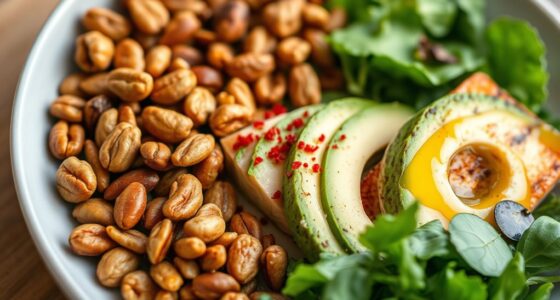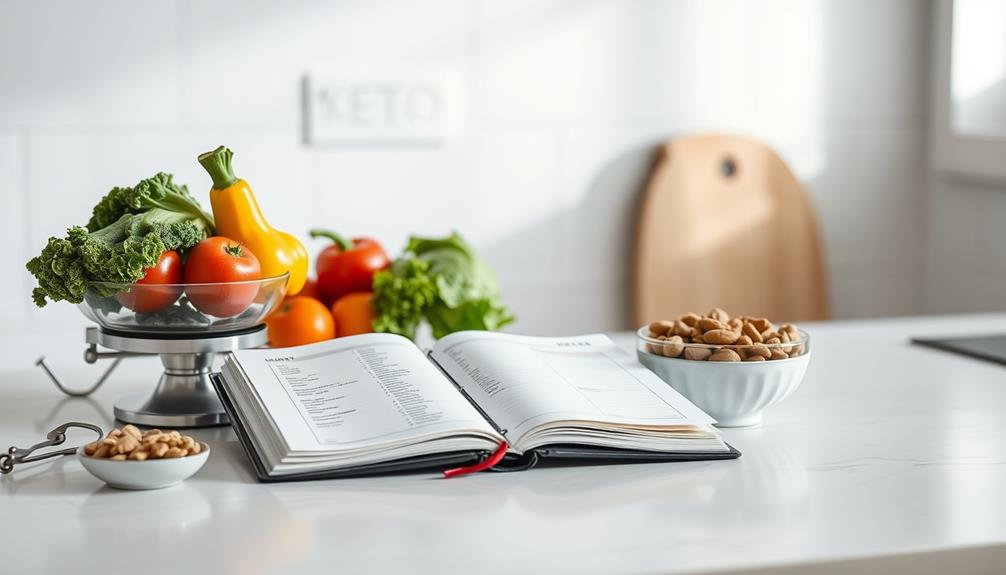To get enough fiber on a keto diet, focus on low-carb, high-fiber foods like leafy greens, broccoli, cauliflower, avocados, and nuts such as chia seeds and flaxseeds. These sources provide both soluble and insoluble fiber, supporting digestion and blood sugar stability while keeping carbs in check. Balancing these options helps prevent constipation and digestive discomfort. Keep exploring to discover more tips on optimizing fiber intake without compromising ketosis.
Key Takeaways
- Incorporate keto-friendly vegetables like leafy greens, broccoli, and cauliflower for natural fiber sources.
- Add seeds such as chia and flaxseeds, and nuts like almonds to boost fiber intake without disrupting ketosis.
- Include healthy fats-rich avocados, which provide both fiber and essential nutrients for digestive health.
- Balance soluble and insoluble fibers to support gut health and regularity within low-carb limits.
- Consider fiber supplements if dietary sources don’t meet your fiber needs while maintaining ketosis.

Dietary fiber plays an essential role in a ketogenic diet, helping you maintain digestive health and regulate blood sugar levels while staying in ketosis. When you’re focusing on low-carb foods, it’s important to understand where to find fiber sources that fit your diet and how they offer digestion benefits. Unlike carbs that quickly spike blood sugar, fiber from keto-friendly sources moves through your digestive system more slowly, supporting regularity and preventing issues like constipation. This means you can enjoy the benefits of fiber without compromising your state of ketosis.
You can find fiber in several keto-compatible foods, such as leafy greens, broccoli, cauliflower, and zucchini. Nuts and seeds, like chia seeds, flaxseeds, and almonds, are also excellent fiber sources that add both crunch and nutrition without pushing your carb count too high. Avocados, which are rich in healthy fats, contain a decent amount of fiber as well, making them a versatile addition to your meals. Incorporating these foods ensures that you’re consuming enough fiber to support digestion benefits, which include softer stools and a healthy gut environment. These benefits are essential because they help prevent digestive discomfort and promote nutrient absorption.
In your quest to get enough fiber on keto, it’s crucial to focus on variety. Different fiber sources can provide both soluble and insoluble fiber, which work together to optimize digestion benefits. Soluble fiber, found in foods like chia seeds and avocados, helps lower cholesterol and stabilize blood sugar levels, while insoluble fiber, present in vegetables like broccoli and cauliflower, adds bulk to your stool, promoting regularity. By mixing these sources, you create a balanced intake that supports your digestive health and keeps your gut functioning smoothly. Additionally, understanding regulatory changes affecting dietary supplements can help you make informed choices about fiber supplements if needed.
Frequently Asked Questions
Can Fiber Intake Affect Ketosis?
Fiber intake can affect ketosis, especially if it leads to fiber fermentation in your gut. When you consume enough fiber, it supports your gut microbiome and promotes healthy digestion. However, some fibers can produce small amounts of glucose during fermentation, which might slightly impact ketosis. Staying mindful of your fiber sources and amounts helps you maintain ketosis while benefiting from improved gut health and digestion.
Are Fiber Supplements Necessary on a Keto Diet?
You might wonder if fiber supplements are necessary for your keto journey. Without enough fiber, your keto digestion could slow, leading to discomfort or constipation. While low-carb foods provide some fiber, they might not suffice. So, adding fiber supplements can help keep your digestion smooth and your ketosis intact. Don’t wait until discomfort strikes—consider fiber supplements now to support your gut health and maintain your keto balance effortlessly.
How Does Fiber Impact Blood Sugar Levels?
Fiber impacts blood sugar levels by slowing digestion and promoting fiber fermentation in your gut, which helps regulate blood sugar spikes. When you consume enough fiber, it creates a steady release of glucose into your bloodstream, preventing sudden increases. This process supports blood sugar regulation, making it easier to maintain ketosis. So, eating fiber-rich, low-carb foods can effectively help you control your blood sugar levels on a keto diet.
What Are the Best Keto-Friendly Fiber Sources?
You should choose fiber-rich snacks like chia seeds, flaxseeds, and almonds to boost your fiber intake on keto. Incorporate keto-friendly grains such as coconut flour and lupini beans for variety. These options help maintain digestion and regulate blood sugar levels while fitting into your low-carb lifestyle. By including these foods, you guarantee you’re getting enough fiber without breaking ketosis.
Does Fiber Help With Keto-Related Digestive Issues?
Fiber absolutely transforms your digestion, turning chaos into calm! When you include enough fiber, it boosts fiber digestion and improves gut health, making bloating, constipation, and discomfort vanish like magic. You’ll feel lighter, more energized, and your digestion will thank you. Incorporating keto-friendly fiber sources helps regulate your gut, supports overall health, and keeps your digestive system running smoothly—so you can conquer your day with confidence!
Conclusion
Seeing how essential fiber is for your digestion and overall health, isn’t it worth exploring tasty low-carb options to meet your needs? With so many keto-friendly, fiber-rich foods like nuts, seeds, and low-carb vegetables, you don’t have to sacrifice variety or flavor. Staying mindful of your fiber intake can help you stay on track and feel your best. So, aren’t you ready to make fiber a key part of your keto journey?









